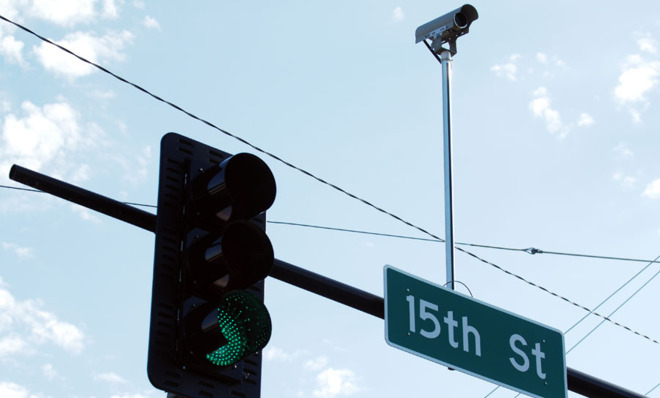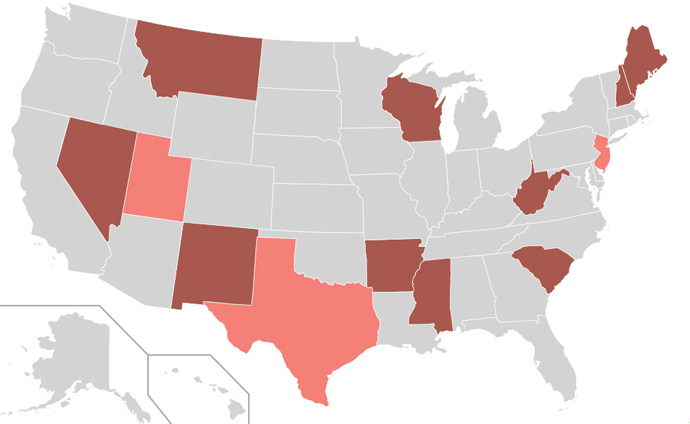Has your state declared war on traffic cameras?
Ten states have already banned both speed and red-light cameras. And more states are considering getting on board.

A free daily email with the biggest news stories of the day – and the best features from TheWeek.com
You are now subscribed
Your newsletter sign-up was successful


Imagine it's Monday morning. You're still a little hungover from that Sunday tailgate or boozy brunch, and you're running late to work and cruising a few miles above the speed limit. You turn down an unfamiliar street and — flash! — an unmarked speeding camera snaps your license plate number. A $100 ticket will soon be in the mail.
Sound familiar? For many Americans, it surely does. But it might be a scenario on the wane. Ten states have recently banned both speed and red-light cameras on the basis that they're an invasion of privacy and may cause accidents, and more states are considering getting on board.
Twelve states use speed cameras and 24 have red-light cameras. It's not hard to figure out why states install traffic cameras: Besides the obvious safety appeal, they rake in big bucks. Fines range from $50 a pop to $1,000, depending on the state. Florida collected more than $100 million in fines from red-light cameras alone in 2012. Chicago rolled out its first speed camera on Oct. 16, and plans to have a total of 50 installed within the next year — bringing in a projected $40 million to $60 million. And in Washington, D.C., a mere nine cameras set over a three-mile strip issued 93,313 tickets worth $11.8 million last year, according to The Washington Post.
The Week
Escape your echo chamber. Get the facts behind the news, plus analysis from multiple perspectives.

Sign up for The Week's Free Newsletters
From our morning news briefing to a weekly Good News Newsletter, get the best of The Week delivered directly to your inbox.
From our morning news briefing to a weekly Good News Newsletter, get the best of The Week delivered directly to your inbox.
But not everyone believes these red-light and speed cameras stop accidents. According to a 2013 study done by the Royal Automobile Club Foundation in the UK, speed cameras reduced fatal and serious collisions in 551 cases, but in 21 locations, accidents increased. Red-light cameras, which aim to stop right-angle crashes, are even more controversial — New Jersey, Florida, and other states have reported that after installing them, rear-end collisions increased, since drivers slammed on their brakes to avoid tickets.
The Highway Safety Research Center at the University of North Carolina at Chapel Hill argues that "right-angle crashes are simply much more dangerous than rear-end collisions," so the cameras might still be worth it.
Privacy advocates disagree. The American Civil Liberties Union (ACLU) strongly opposes red-light and speed cameras, on the basis that the data collected by the cameras is being stored in databases and used for other purposes, like monitoring people crossing the Oklahoma-Texas border, for example. "Government and private-industry surveillance techniques created for one purpose are rarely restricted to that purpose," writes Andrew Schneider Executive Director of the ACLU.
Head over to the the Governors Highway Safety Association for more detailed information on each state.
A free daily email with the biggest news stories of the day – and the best features from TheWeek.com
Dana Liebelson is a reporter for Mother Jones. A graduate of George Washington University, she has worked for a variety of advocacy organizations in the District, including the Project on Government Oversight, International Center for Journalists, Rethink Media, the Reporters Committee for Freedom of the Press, and Change.org. She speaks Mandarin and German and plays violin in the D.C.-based Indie rock band Bellflur.
-
 The week’s best photos
The week’s best photosIn Pictures An explosive meal, a carnival of joy, and more
-
 The ‘ravenous’ demand for Cornish minerals
The ‘ravenous’ demand for Cornish mineralsUnder the Radar Growing need for critical minerals to power tech has intensified ‘appetite’ for lithium, which could be a ‘huge boon’ for local economy
-
 Why are election experts taking Trump’s midterm threats seriously?
Why are election experts taking Trump’s midterm threats seriously?IN THE SPOTLIGHT As the president muses about polling place deployments and a centralized electoral system aimed at one-party control, lawmakers are taking this administration at its word